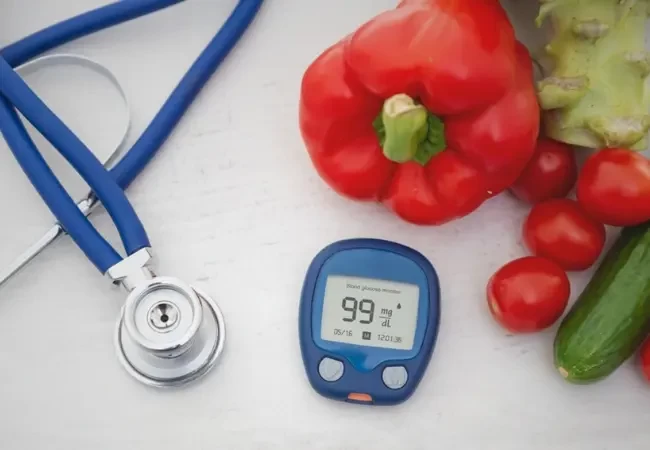Blog
Diabetes
and
Diet

Diabetes and Diet: Healthy Eating for Effective Diabetes Management
 Medically reviewed by: Ms. Neetha Pratheep, Sr. Consultant - Nutrition and Dietetics - Written by Jasni Salim - Updated on 31/05/2024
Medically reviewed by: Ms. Neetha Pratheep, Sr. Consultant - Nutrition and Dietetics - Written by Jasni Salim - Updated on 31/05/2024Diabetes and diet are interconnected with each other. It simply means eating healthy foods in moderate amounts and sticking to regular mealtimes. It is a plan that is rich in nutrients, low in fat and calories and includes lots of fruits, vegetables, and whole grains. This kind of diet is actually great for everyone not just for those with diabetes. Here you will know about how to do diabetes management with proper diabetes and diet education.
Why Do You Adopt a Healthy Eating Plan?
If you have diabetes or prediabetes, your doctor might suggest seeing a dietitian to create a healthy eating plan for diabetes management. This plan will help you manage your blood sugar, control your weight, and reduce the risk of heart disease by managing factors like high blood pressure and high blood fats.
When you eat too many calories and carbs, your blood sugar goes up. Uncontrolled blood sugar will lead to serious issues like high blood sugar (hyperglycemia) which can cause long-term problems like nerve, kidney, and heart damage.
To keep your blood sugar safe, it is essential to make healthy food choices and keep track of what you eat. For many with type 2 diabetes, losing weight can also help control blood sugar and has other health benefits. A healthy eating plan is a safe, nutritious way to reach a healthy weight.
What Does a Diet Involve for People with Diabetes?
A diet for people with diabetes focuses on eating healthy meals at regular times. This helps your body use insulin better, whether it is made by your body or taken as medicine.
A registered dietitian can help you create a diet that fits your health goals, tastes, and lifestyle. They can also give you the right diabetes and diet education on how to improve your eating habits like choosing the right portion sizes for your body size and activity level.
Recommended Foods
Healthy carbohydrates
When you eat, your body breaks down sugars and starches into blood glucose. Sugars are simple carbohydrates while starches are complex carbohydrates. It is important to focus on healthy carbohydrates like:
- Fruits
- Vegetables
- Legumes like beans and peas
- Whole grains
- Low-fat dairy products like milk and cheese
Stay away from unhealthy carbohydrates like foods or drinks that have added sugars, fats, and sodium.
Fiber-rich foods
Dietary fiber is the part of plant foods that your body cannot digest or absorb. Fiber will help manage how your body digests food and control blood sugar levels. Foods that are high in fiber include:
- Fruits
- Vegetables
- Nuts
- Whole grains
- Legumes, such as beans and peas
Good fats
Foods with monounsaturated and polyunsaturated fats will help reduce your cholesterol levels. Such foods are as follows:
- Nuts
- Avocados
- Canola, olive and peanut oils
- But do not overeat it as all fats are high in calories.
Heart-healthy fish
Eat heart-healthy fish twice a week at least. Fish like salmon, tuna, mackerel, and sardines are high in omega-3 fatty acids. Omega-3s will help prevent heart disease. Do not eat fried fish and fish with high mercury levels like cod.
Foods to Not Eat
Diabetes will increase your risk of heart disease and stroke by speeding up the clogging and hardening of arteries. Foods with the following can affect your heart-healthy diet goals:
- Trans fats: Do not consume trans fat found in baked goods, shortening, processed snacks, and stick margarines.
Saturated fats: Avoid animal proteins and high-fat dairy products like butter, hot dogs, beef, sausage, and bacon. Consume coconut and palm kernel oils in limit. - Sodium: Try to consume no more than 2,300 mg of sodium a day. If you have high blood pressure, your healthcare provider may suggest a lower amount.
- Cholesterol: Cholesterol comes from high-fat dairy products, high-fat animal proteins, egg yolks, liver, and other organ meats. Try to have no more than 200 milligrams (mg) of cholesterol a day.
Create a Complete Plan
The Plate Method
The American Diabetes Association will suggest an easy way to plan your meals. It will focus on eating more vegetables. Follow the steps below when you make your plate:
- Fill half of your plate with veggies like carrots, spinach, and tomatoes.
- Use a quarter of your plate for lean proteins like lean pork, tuna, or chicken.
- Use the remaining quarter for carbs like brown rice or starchy veggies like peas.
- Include "good" fats like avocados or nuts in small amounts.
- Have a serving of fruit or dairy and drink unsweetened tea, water, or coffee.
Count Carbohydrates
Carbohydrates turn into sugar and affect your blood sugar the most. To manage your blood sugar you might need to learn how to calculate the carbs you eat with a dietitian's help. Then, you can adjust your insulin dose as needed. It is important to keep track of the carbs in each meal or snack. A dietitian can show you how to measure food portions and understand food labels. You will also learn about diabetes and diet and pay close attention to serving sizes and how much carbohydrate is in your food.
Select Your Foods
A dietitian will suggest best food for diabetes control to help you plan meals and snacks. You can pick from lists of foods grouped by carbs, proteins, and fats. One serving in a group is called a choice. Each choice in the same group has a similar amount of carbs, protein, fat, and calories, and will affect your blood sugar similarly. For example the starch, fruits, and milk list includes choices that have 12 to 15 grams of carbs.
Glycemic Index
People with diabetes sometimes use the glycemic index to choose foods especially carbs. This system ranks carb-containing foods based on how they affect blood sugar levels. Ask your dietitian if this method could work for you.
Conclusion
If you have diabetes it is important to work with your doctor and dietitian to make a meal plan that suits you. Use best food for diabetes control and follow a schedule to manage your blood sugar. Not following your diet will lead to unstable blood sugar and serious health problems.
You can visit Silverline hospital which is the best diabetes hospital in Kochi, Kerala. We will provide top quality care for patients with diabetes, thyroid issues, and other hormone related problems. Our dedicated team will work hard to offer excellent care and aims to become India's top diabetes hospital.

More Blogs
-

Struggling with Erection or Early Ejaculation? Here's How to Get Help
Struggling with erectile dysfunction or premature ejaculation? Learn common causes, treatments, and how to seek professional help with confidence.
-

When Should Diabetics Eat? Expert Tips on Meal Timing and Blood Sugar Control
Learn how diabetics can optimize meal timing to better control blood sugar. Expert tips for healthier, more balanced living.
-

Facing the Fear: Understanding Psychological Erectile Dysfunction Before Marriage
Discover the causes and solutions for psychological erectile dysfunction before marriage. Gain insight, support, and confidence for a healthy relationship.
-

Why Overweight Individuals Should Embrace Early Dinners
Ready to lose weight smarter? See why early dinners are a game-changer for overweight individuals aiming for lasting health and weight control.
-

Overweight? Start with This One Powerful Lifestyle Change
Struggling with weight? Most of us eat our heaviest meal of the day at night, usually after 9 or even 10 PM.


 Home
Home  Booking
Booking
 Chat Now
Chat Now  Call Us
Call Us